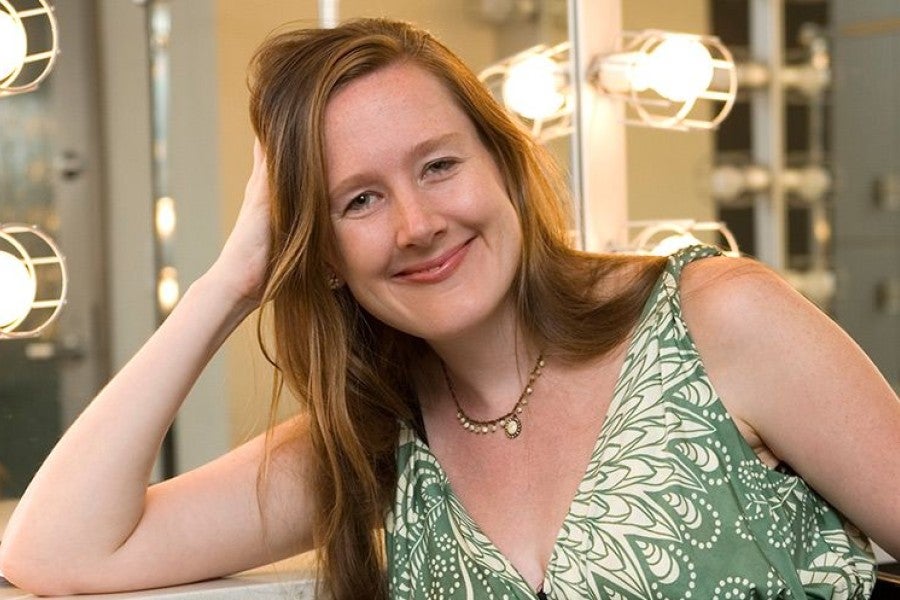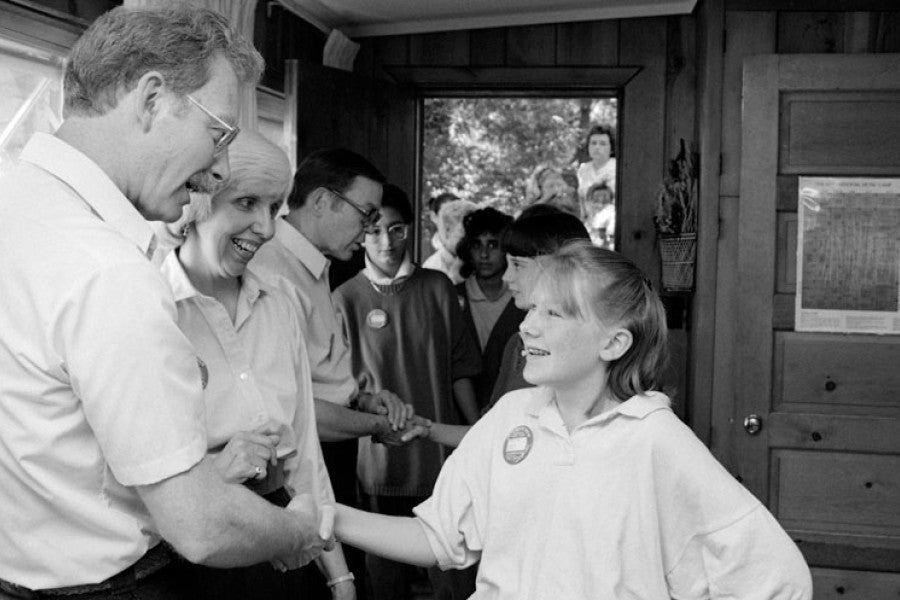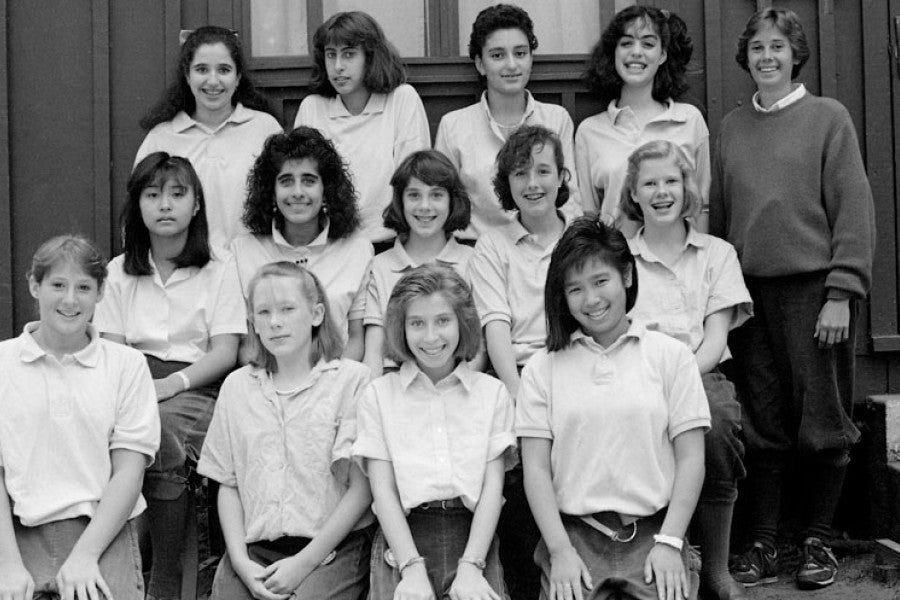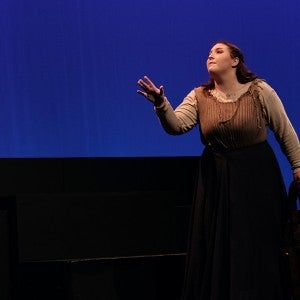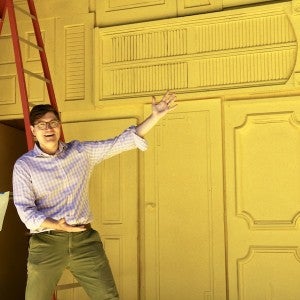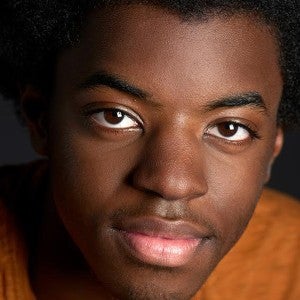Summers, smiles, and separation with Sarah Ruhl
Before becoming a two-time Pulitzer Prize nominated playwright, Sarah Ruhl spent her summers immersed in the arts at Interlochen. Now her children are following in her footsteps.
In their Brooklyn home, playwright and two-time Pulitzer Prize finalist Sarah Ruhl (IAC/NMC 87-88, 90) accompanies her children on piano as they practice violin.
Piano was a skill Ruhl picked up during her childhood in Chicago. In fact, it was her former piano teacher Barbara Rubenstein who first told her about Interlochen.
“Honestly, I was not a very good pianist,” Ruhl said with a laugh. “I could never have competed at the level of an Interlochen music major, but I loved piano...I loved all the arts.”
Ruhl’s predisposition as a dilettante led her to study a wide variety of majors during her summers at Interlochen: visual arts, drama, piano, chorus, and operetta. Ruhl would have studied creative writing, too, but it wasn’t offered during her time at Camp. That, fortunately for Ruhl’s eldest child Anna, is no longer the case.
“[Anna] was seduced by this beautiful building,” Ruhl said. “When she saw [The Writing House] she said, ‘I'm going there! I'm gonna write all day.’”
And so she did. Ruhl’s daughter spent her summer studying creative writing at Interlochen. For Ruhl, returning to Interlochen to drop off her daughter was surreal.
“I had to go to the Melody Freeze, and I had to just walk along the water,” Ruhl said. “I found my old cabin. Texted my own friends with what cabin Anna was in.”
Ruhl begins to hum the Interlochen Theme.
“I dreamed of Interlochen for a long time after,” Ruhl said. “I went three summers, but I would dream about it all the time.”
“Practicing by myself in the woods. To me, that's heaven. And you hear the sounds of other people working around you, so you don't feel lonely. You feel at home in your solitude, and that is such a gift to give to a young person, a young artist,” Ruhl said.
Prior to Interlochen, Ruhl was lucky enough to have a family and community that supported the arts, but even so, she adds, “It wasn't until I went to Interlochen that I actually felt surrounded by a group of like-minded individuals who basically were content to eat, play music in the woods, talk about art, and go to sleep. That, to me, it was a social bath. It was like pressing a reset button. It was really transformative.”
Though Ruhl is known as a playwright, she didn’t attempt the genre until her junior year at Brown University. At the time, Ruhl had aspirations to be a poet, but faculty member and Pulitzer Prize-winning playwright Paula Vogel saw her potential elsewhere.
Eventually, Ruhl came around to the idea, and would go on to complete her Master of Fine Arts in playwriting from Brown University in 2001. Vogel’s intuitions were right, as it wasn’t long before Ruhl’s work began to get noticed. In 2003, Ruhl was awarded the Helen Merrill Emerging Playwright Award and the Whiting Writers’ Award. Then, over the course of the next decade, Ruhl would go on to receive two Pulitzer Prize in Drama nominations (2005 and 2010), be awarded a MacArthur Fellowship (Class of 2006), and win the PEN/Laura Pels International Foundation for Theater Award in 2008.
Ruhl’s plays have been produced at Lincoln Center Theater, Goodman Theatre, Playwrights Horizons, Second Stage, Yale Repertory Theatre, Berkeley Repertory Theatre, Cornerstone Theater, The Wilma Theater, Madison Repertory Theatre, and the Piven Theatre, just to name a few.
Over the years, Ruhl’s work has been described in a number of colorful ways. Much to Ruhl’s chagrin, it isn’t uncommon to find the words “quirky” or “whimsical” hastily applied to her shows. These oversimplifications are to be expected. Ruhl’s writing pairs the mundane with the magical; crossing and transcending both genre and style within single sentences.
In Ruhl’s play Dead Man’s Cell Phone, an unanswered cell phone leads to the discovery that the owner of the phone has died while sitting at his cafe table. What follows is a series of increasingly bizarre and somewhat metaphysical events as the protagonist uses the dead man’s phone to learn more about his life.
The dialogue is quick, heightened, yet naturalistic. Ruhl’s stage directions are notoriously provocative and challenging. In one scene, Jean, the protagonist, meets up with the dead man’s brother, Dwight:
Dwight exits.
Jean sits alone.
She looks small and tired.
An Edward Hopper painting, for 5 seconds.
Dwight re-enters with some caramel popcorn.
In the play’s notes for the director and designers, Ruhl writes, “Transitions are fluid. Space is fluid. There is not a lot of stuff on the stage. Enjoy yourself.”
“Enjoy yourself” seems to be a fitting mantra for Ruhl’s oeuvre. Whether it’s her play Eurydice, a retelling of the myth of Orpheus from the point of view of his wife Eurydice, or her exploration of Victorian medical treatments in In the Next Room, or the vibrator play, Ruhl isn’t afraid to interject a sense of levity into serious subject matter.
“When I started out writing, I thought I had to write history plays because then people could speak in a heightened, theatrical way,” Ruhl said. “So, my first play was a play called Passion Play, and it started out in the 1600s—1675, and jumped around. And then I realized as I kept writing that I could write contemporary plays and still have people talk the way I wanted them to talk.”
As a professor at the Yale School of Drama, these insights often make their way into Ruhl’s classroom. Those preconceived notions didn’t nourish her art—so Ruhl gave them up.
“What I tell students is to be like whales,” Ruhl said. “Whales have these sieves that automatically separate the krill. They just open their mouths wide and they swallow water, and some krill goes in and they sift out the rest. It's like you have to be slow, moving through the water, swallowing the water, taking in the krill, and filtering out what doesn't serve you.”
Back in their Brooklyn home, however, beyond her accompaniment at the piano, Ruhl’s tries to keep a supportive but hands-off approach when dealing with her children’s artistic endeavors.
“Anna’s absolutely in charge of her own process. She knows that,” Ruhl said. “I think it was profound, too, dropping her at Interlochen, because it was her first sleep-away camp. I remember standing at that little gazebo in Intermediate Girls. I was just standing there after saying goodbye.”
Ruhl recalls her own summers at Interlochen, the “bunch of misfits” in her cabin who formed their own interim family while away from their parents. How important that was for her then, and how important it is for her now knowing that Anna is doing the same at Camp.
“It's hard to separate from your parents, especially for these sensitive souls who run around making art,” Ruhl said. “It was interesting that a place, which had been a holding place for my own separation then, is now a holding place for my daughter.”
Ruhl recently completed a memoir, titled “Smile,” about the medical complications she faced after giving birth to her twins—which includes paralysis of her face due to Bell's palsy. The forthcoming memoir will be published by Simon & Schuster. A release date has not yet been announced. In 2020, Ruhl will release her first book of poetry.
